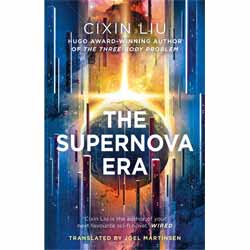|
Click here to return to the main site. Book Review
Far off in the darkest reaches of space a sun goes supernova. Hidden by interplanetary dust Earth has no warning or defence against the wave of high energy radiation which will bathe the whole globe. When it hits it damages the chromosomes. It is soon determined that anyone above the age of thirteen will be dead within a year after which Earth will be a planet of children... The Supernova Era (2019. 348 pages) is a new novel from Cixin Liu, the Chinese, Hugo award winning author of The Three Body-Problem. The story is told partly in retrospect and partly presented as events occurring in real time. As an idea, it’s an interesting one. What would a world look like if only the children survived? The initial thought would be one of chaos and mass extinction, but Lui has cleverly offered up humanity a whole year to prepare, to allow the children to continue civilisation as we know it. With the lack of time available, children are usually taught whatever profession their parents are engaged in, regardless of their aptitude. Violent games are held to try and find children with the right attributes to take over the running of the country, regardless of whether they want to. Thematically the first part of the book is very much about how the adults are desperate to maintain the status quo of the massively interlinked set of skills which keep civilisation together. On one hand, this seems to be the best course. Left to themselves, without accelerated learning, the children’s world would fall to death and chaos, drowned in its own complexity. It’s an old conundrum, that almost no single person could produce something as simple as a metal spoon. The thing is, none of the adults consider asking the children what they would like to do. What follows in the novel is the charting of the fall of the adult civilisation and the painful transition into a civilisation acceptable to the children. The novel covers quite a large time span with many characters and at times the discourse of ideas is at the expense of character development. The translation, by Joel Martinsen, comes over as quite dry, though this may have been inherent in the original Chinese version. In many ways the book reminded me of Olaf Stapledon’s First and Last Men (1930) another book where ideas supplanted focus on characters when dealing with monumental events. Its Lord of the Flys take on the end of the world remains imaginative and while I would disagree with some of the choices the children made, I’m guessing that this, to some extent, was the point of the book, to prove that adults will inevitably suffer from rigid thinking. 8 Charles Packer Buy this item online
|
|---|


